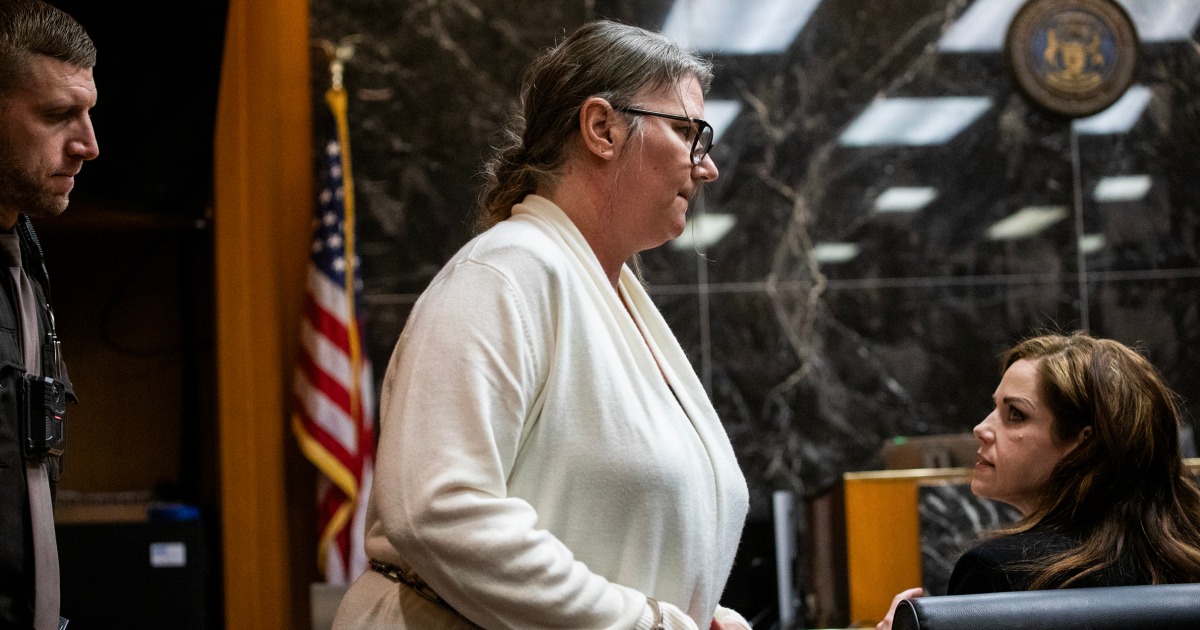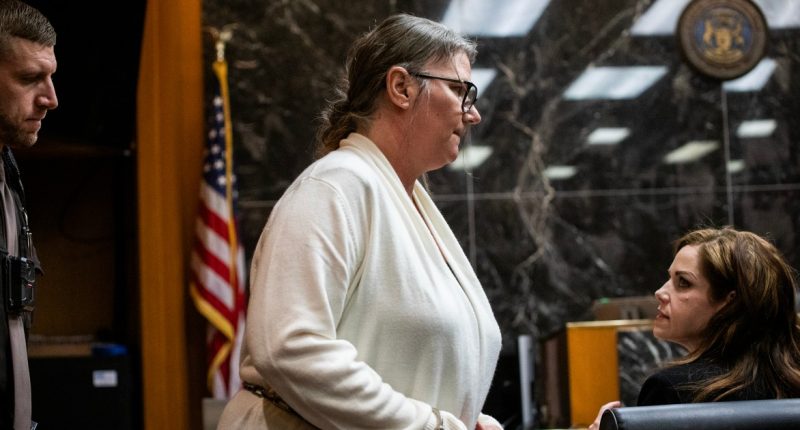
In many ways, Jennifer Crumbley’s parenting was on trial when she was ultimately found guilty Tuesday of involuntary manslaughter in her son’s school shooting spree in suburban Detroit in 2021.
Prosecutors in Oakland County, Michigan, picked apart the time she spent with her horses, an extramarital affair, the ignoring of text messages from her teenage son, Ethan, now imprisoned, and her decision not to seek out a mental health professional for him in order to highlight a perceived pattern of neglectful actions.
Now, with a conviction against Crumbley, what parents do or fail to do will come under further scrutiny and potentially lead to more criminal prosecutions, some legal experts contend, and not solely for cases of mass shootings.
“The theory of, ‘Hey, if the parents were better parents, this wouldn’t have happened,’ I can easily see prosecutors using that,” said Michael Bullotta, a former federal prosecutor-turned-defense lawyer in Detroit.
Jeffrey Swartz, a former county judge in Florida and professor at the Cooley Law School in Michigan and Florida, said prosecutors “in areas with a strong anti-gun sentiment” will have a blueprint in bringing charges against parents of a shooter, and not only in mass shootings, but in cases where even a single person is killed.
“And you can’t limit this to just guns,” he said. “What if we now broaden the type of weapon that was used in a manslaughter case? What if it was a baseball bat? Now you’re pushing the envelope.”
The trial against Crumbley, 45, was notable: It was the first time a parent in the U.S. was held criminally responsible for a child’s school shooting. Ethan Crumbley was 15 when he killed four students and injured several others at Oxford High School. He was sentenced in December to life in prison without parole.
Crumbley and her husband, James, helped his son buy a semi-automatic handgun as an early Christmas gift just days before the shooting; Jennifer Crumbley also took the teen to a shooting range the weekend before the rampage.
To find Crumbley guilty of the four counts of involuntary manslaughter — each representing one of the victims — the jury had to agree that she was either “grossly negligent” when she failed to properly store the firearm to prevent access to her minor son, or that as a parent, she had a “legal duty” to prevent her son from harming others, but neglected that responsibility.
Much of the trial centered on the day of the shooting, when James and Jennifer Crumbley were called to a school counselor’s office after a teacher found Ethan’s drawing of a gun, a shot person and messages, including, “The thoughts won’t stop. Help me.” Neither parent at the meeting mentioned Ethan’s gun and both declined to take him home because they had work; the high school sophomore would carry out the attack only hours later.
Oakland County prosecutor Karen McDonald told the jury during closing arguments that Crumbley could have done “the smallest thing” that day to potentially avert the shooting, from warning the counselors that her husband had bought Ethan a gun to checking her son’s backpack to going home to ensure the weapon was locked.
The foreperson of the 12-member jury told NBC News that she was swayed by the belief that Crumbley was the last person who had custody of the gun when she took Ethan to a shooting range, and therefore, was responsible for it. Jurors were shown video of the mother and son at the range.
“This is the last picture we have of that gun until we see it murder four kids on Nov. 30, and the person holding it is Jennifer Crumbley,” McDonald told jurors. “She’s the last person that we see with that gun. She’s the person that said it was in her car. Then she said it was in her house.”
Crumbley testified that she left the responsibility of storing the weapon to her husband, who also had two other guns he kept locked.
The foreperson, Alex, whose last name is being held to protect her privacy, said Wednesday that “the picture of her handling the gun last was pretty damning for me.”
Crumbley’s defense lawyer, Shannon Smith, said in her closing argument that her client was a caring mother, but despite being “hypervigilant,” at times she was unable to predict her son’s looming violence, telling jurors that they “could easily be in her shoes.”
She also suggested that a child could commit a criminal act by using a knife to kill or a phone to send a lewd picture, and a parent may not have the foresight to prevent that either.
“Can parents really be responsible for everything their children do?” Smith asked.
During jury deliberations, Alex said the panel agreed not to judge Crumbley on being a good or bad parent, but whether she was negligent in a way that allowed for the shooting to occur.
The examples given by Smith were “too hypothetical,” Alex said.
But some legal experts don’t necessarily believe that’s the case.
“What if instead the parents knew he had a friend, and at the friend’s house, he had guns, but the parent still let their child go there and he uses it to kill? You can think of any number of situations,” Bullotta said. “It’s a slippery slope that can lead to countles scenarios that parents can’t foresee.”
Swartz added that a parent can be fully involved in a child’s life and that child may still be harboring secrets, whether they’re innocuous or include violence.
“Even if you ask a teenager, they can go, ‘Leave me alone. Get off my back,'” he said. “And if it’s really horrible, do you think they’re going to tell?”
Lawyer Mark Chutkow, who previously led the criminal division of the U.S. Attorney’s Office in Detroit, said the trial against Jennifer Crumbley was “groundbreaking, but not necessarily precedent setting.”
He said the prosecution’s case was buoyed by the reams of evidence, including Ethan’s journals saying he asked for help from his parents to no avail, the seeming lack of urgency displayed by his mother and messages in which she voiced concern about her son’s drawing but then didn’t share the existence of the gun to his school.
A groundbreaking case such as this one will have “extreme elements” that will help set up the prosecution, Chutkow added, “but there aren’t always going to be other cases that will be this awful where the facts were extreme and the violence was extreme, too.”
He added that items like a knife, a cellphone or other everyday objects that can be used in a crime don’t have the same meaning as a gun, and the weapon’s power is heightened in a mass shooting, where there is an immediate public outcry to hold people accountable.
“Guns are effective instruments of harm,” Chutkow said. “That’s how they’re designed, and so when a child has access to it, that must put a parent on heightened notice.”
The prosecution’s case will be tested again next month, when James Crumbley goes on trial for the same four counts of involuntary manslaughter. In April, Jennifer Crumbley will be sentenced, and faces up to 15 years per count.
A gag order remains in the case for the prosecution and defense, and it’s unclear if Crumbley plans to appeal.
Alex said she recognized the weight that the jurors had in deciding their verdict.
“I’m not concerned with the precedent it sets — I’m just hopeful that it never happens again,” she said of another mass shooting.
Source: | This article originally belongs to Nbcnews.com










